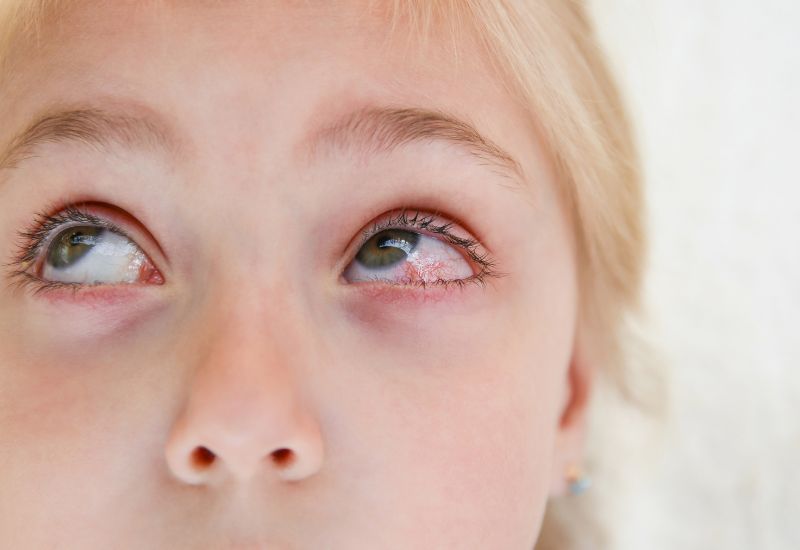Pink eye, also known as conjunctivitis, is an eye condition where the conjunctiva—the thin, transparent layer covering the inner surface of the eyelid and the white part of the eyeball—becomes inflamed. Many people commonly believe that pink eye is contagious. Is this true? Thu Cuc TCI will provide detailed insights into whether pink eye is contagious and what you need to know. Read on if you are interested.
1. Answering the Question: Is Pink Eye Contagious?
1.1. Symptoms of Conjunctivitis
The symptoms of conjunctivitis can vary depending on the cause, but the most common signs include:
– Swollen, Red Eyes: Blood vessels in the eyes become dilated, and increased fluid secretion causes swelling and redness.
– Itching: Itchiness in and around the eyes is a typical symptom of conjunctivitis.
– Pain and Discomfort: Another common symptom is pain or discomfort in the eyes.
– Tearing: The eyes may produce more tears than usual.
– Light Sensitivity: Sensitivity to light can cause increased discomfort when experiencing conjunctivitis.
– Discharge: Bacterial pink eye may produce white or yellow pus.
– Pseudomembrane Formation: In severe cases, a thin film can cover the inner eyelid, indicating severe conjunctivitis.

conjunctivitis often causes swelling and redness due to dilated blood vessels and increased discharge.
1.2. Causes of Pink Eye
Pink eye can arise from various causes, including:
– Bacteria: Bacterial conjunctivitis is caused by bacteria such as Staphylococcus aureus, Streptococcus pneumoniae, Haemophilus influenzae, Moraxella catarrhalis, and Chlamydia trachomatis. This type affects both children and adults.
– Viruses: Viral conjunctivitis is often caused by viruses like Adenovirus (common in spring and summer), Herpes simplex virus (HSV), Varicella-zoster virus (VZV), and Enterovirus.
– Allergies: Exposure to allergens such as animal dander, pollen, dust, chemicals, or certain medications can trigger allergic conjunctivitis.
– Eye Injuries: Physical trauma to the eye can lead to conjunctivitis if not promptly and properly treated.

Varicella-zoster virus (VZV) is a common cause of conjunctivitis.
1.3. Is Pink Eye Contagious?
Whether pink eye is contagious depends on the underlying cause. Pink eye caused by bacteria or viruses is contagious. Conversely, pink eye resulting from allergies or physical injuries is not contagious.
Transmission of Conjunctivitis
The modes of transmission for contagious pink eye vary based on the cause:
– Bacterial Conjunctivitis: Can spread through direct or indirect contact with eye discharge.
– Viral Conjunctivitis: Can spread through direct or indirect contact with tears, nasal discharge, or throat secretions of an infected person.
You can contract bacterial or viral conjunctivitis by touching surfaces contaminated with these microorganisms such as tables, chairs, doorknobs, and railings, and then touching your eyes, nose, or mouth. Sharing personal items like towels, pillows, face cloths, toothbrushes, or eating utensils with an infected person can also spread the infection. Additionally, engaging in sexual activity with someone who has the infection is another, less commonly known transmission route.
2. Preventing Pink Eye
To minimize the risk of contracting or spreading conjunctivitis, consider the following preventative measures:
– Avoid Contact with Infected Individuals: Refrain from direct contact with someone who has conjunctivitis, especially if they are experiencing tearing or pus discharge. If contact is necessary, wear a mask and wash your hands thoroughly afterward.
– Frequent Hand Washing: Wash your hands with soap and water for at least 20 seconds frequently, especially after returning home from public places and before cooking or eating.
– Avoid Touching Your Face: Refrain from touching your eyes, nose, and mouth to prevent the transmission of pathogens.
– Do Not Share Personal Items: Avoid sharing personal items to reduce the risk of spreading infections.
– Maintain Clean Living Spaces: Regularly clean household surfaces and launder bedding and pillowcases.

Washing hands effectively kills bacteria and viruses that cause conjunctivitis.
If you or a family member exhibit symptoms of pink eye, consult a doctor promptly. The doctor will diagnose the cause and prescribe the appropriate treatment. Different causes require different treatments, such as antibiotics for bacterial conjunctivitis and antiviral medications for viral conjunctivitis. Avoid self-medicating to prevent complications.








